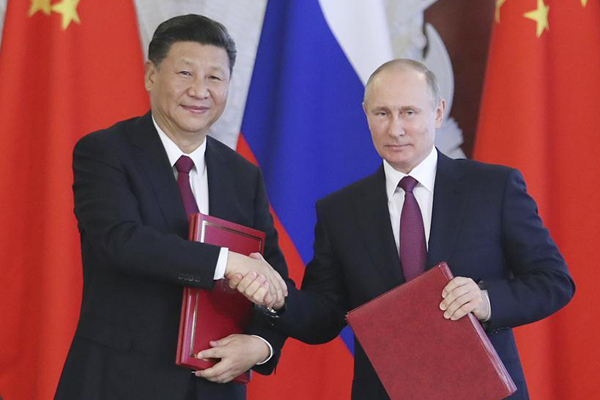President Xi said, both countries should also enhance cooperation in various areas including education, culture, sports, tourism and media, so as to promote mutual understanding and traditional friendship.
Chinese President Xi Jinping and his Russian counterpart Vladimir Putin attend a signing ceremony after their talks.
MOSCOW, July 4 (Xinhua) -- Chinese President Xi Jinping wrapped up a 26-hour compact visit to Russia on Tuesday afternoon with stronger bilateral ties and an expanding cooperation agenda.
In his sixth tour to Russia since assuming office, Xi met with Russian President Vladimir Putin and Prime Minister Dmitry Medvedev, and signed joint statements with the Russian side on further deepening their comprehensive strategic partnership of coordination and on stances on major international affairs.
Xi and Putin, boasting close working relationship and intimate personal friendship, have met with each other for 22 times for the past five years. In an apparent gesture to support the Xi-proposed initiative, Putin came to Beijing in May to attend the Belt and Road Forum for International Cooperation.
Practices have proved that the China-Russia relations are mature and solid, unaffected by outside environments, and serve as an example for harmonious coexistence and win-win cooperation between world's major countries and neighbors, said a statement jointly signed by the two leaders.
Under new historical conditions, the two countries will devote to further consolidating their relations based on equality, trust, mutual support, common prosperity and enduring friendship, and promoting deeper political mutual trust, practical cooperation, security cooperation, people-to-people exchanges and international coordination, said the document.
The China-Russia relations have gone beyond bilateral level, and become an important factor in safeguarding international strategic balance and the world's peace and stability, it said.
The two countries agreed that they will prioritize each other in diplomatic activities, support each other in safeguarding their core interests including sovereignty, security and territorial integrity, with the two heads of state continue to play a strategic leading role in bilateral ties.
On practical cooperation, the two sides agreed to carry on the synergy of their respective development strategies and the synergy between the Belt and Road Initiative and the Russia-led Eurasia Economic Union, deepen practical cooperation on various fields, and consolidate the material basis for the development of China-Russia ties.
The two presidents spoke highly of the Belt and Road Forum for International Cooperation, and agreed on taking concrete measures to promote cooperation projects on cyber security, Arctic research, space, trade, technology, connectivity, finance and the BRICS cooperation.
Xi and Putin also pledged to jointly push for the implementation of the Paris Agreement on climate change and expand China-Russia cultural and people-to-people exchanges.
In a meeting with Medvedev, Xi urged the two countries to carry out the Northern Sea Route cooperation so as to realize an "Ice Silk Road," and earnestly implement various connectivity projects.
With a vast potential and a broad prospect for their practical cooperation, China and Russia should upscale cooperation in economy and trade, investment and energy, implement major manufacturing cooperation projects, strengthen high-speed rail cooperation and push for an early start of the Moscow-Kazan high-speed railroad project, said Xi.
The two countries should also enhance cooperation in various areas including education, culture, sports, tourism and media, so as to promote mutual understanding and traditional friendship, he said.
The Chinese president hailed the fruitful results of bilateral cooperation in trade and investment against the backdrop of a sluggish world economy and gloomy international trade and investment.
He told Medvedev that China firmly sticks to promoting cooperation with Russia and is confident in jointly addressing global challenges with Russia.
On major international issues, Xi and Putin vowed to work together and establish a comprehensive and effective security mechanism in Northeast Asia as early as possible, so as to secure lasting peace and stability in the region.
They expressed strong opposition against the unilateral installation of anti-missile system in Europe and Asia-Pacific by some countries at the expense of others' security interests.
Regarding the Syria issue, the two countries called for the respect of Syria's sovereignty and independence, and urged comprehensive dialogue inside the Middle East nation to settle the current crisis through political and diplomatic means.
The United Nations should play a leading role in managing the peace talks between the Syrian government and the opposition and combating international terrorism, the two countries stressed in the joint statement on major international issues.
China and Russia spoke highly of the latter's sending of its air force to Syria at the invitation of the Syrian government to combat terrorism and protect the country's territorial integrity and sovereignty.
Speaking of the Afghanistan situation, Xi and Putin expressed worries over the expansion of extremist and terrorist groups such as the Islamic State in the Asian country.
Russia highly praised China's latest shuttle diplomatic efforts with Pakistan and Afghanistan, saying the moves improve the two neighbors' relations and promote the domestic reconciliation in Afghanistan, among all the positive results.
Russia was the first leg of Xi's ongoing foreign trip. The Chinese leader then traveled to Germany for a state visit and attendance at the Hamburg G20 summit.
